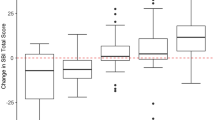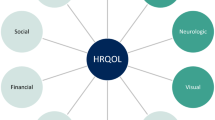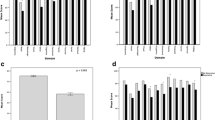Abstract
Health-related quality of life (QOL) outcomes are frequently used by clinicians, patients, and researchers for assessing the effectiveness of an intervention. Small differences in QOL may be statistically significant but their clinical relevance remains undefined. The smallest changes in QOL scores of the anterior skull base surgery questionnaire (ASBS-Q) which could be considered clinically significant have not been delineated. Here we present a meta analysis and review of the literature of 273 patients undergoing skull base tumor resection. The minimal clinically important difference (MCID), defined as “the smallest change in QOL which patients perceive as beneficial”, was calculated using several statistical approaches. The MCID of the ASBS-Q was 0.4 (8%, score range 1–5). Various other instruments for QOL estimations revealed a larger range of MCID score (between 6.2%–17.5%) for the different QOL domains. The statistical analyses reveal that histology (benign vs malignant), time elapsed from surgery (< or ≥6 months), and surgical approach (open vs endoscopic) have significant clinical impact on different QOL domains. This paper brings level 1b evidence which demonstrates the importance of MCID as an adjunct for estimation of QOL in patients undergoing skull base surgery.

Similar content being viewed by others
References
Papers of particular interest, published recently, have been highlighted as: • Of importance
Gil Z, Cohen JT, Spektor S, Shlomi B, Fliss DM. Anterior skull base surgery without prophylactic airway diversion procedures. Otolaryngol Head Neck Surg. 2003;128(5):681–5.
• Gil Z, Abergel A, Spektor S, Shabtai E, Khafif A, Fliss DM. Development of a cancer-specific anterior skull base quality-of-life questionnaire. J Neurosurg 2004;100(5):813–9. First to assess and validate a skull base surgery—specific questionnaire.
Guyatt G, Walter S, Norman G. Measuring change over time: assessing the usefulness of evaluative instruments. J Chronic Dis. 1987;40(2):171–8.
Jaeschke R, Singer J, Guyatt GH. Measurement of health status. Ascertaining the minimal clinically important difference. Control Clin Trials. 1989;10(4):407–15.
Cella D, Hahn EA, Dineen K. Meaningful change in cancer-specific quality of life scores: differences between improvement and worsening. Qual Life Res. 2002;11(3):207–21.
Osoba D, Tannock IF, Ernst DS, Neville AJ. Health-related quality of life in men with metastatic prostate cancer treated with prednisone alone or mitoxantrone and prednisone. J Clin Oncol. 1999;17(6):1654–63.
• Doyle C, Crump M, Pintilie M, Oza AM. Does palliative chemotherapy palliate? Evaluation of expectations, outcomes, and costs in women receiving chemotherapy for advanced ovarian cancer. J Clin Oncol 2001;19(5):1266–74. Group showed that patient expectations from palliative chemotherapy are often unrealistic. Objective responses were low; still it was associated with substantive improvement in patients’ emotional function and global QOL.
Purcell A, Fleming J, Bennett S, Burmeister B, Haines T. Determining the minimal clinically important difference criteria for the Multidimensional Fatigue Inventory in a radiotherapy population. Support Care Cancer 18(3):307–15.
Maringwa J, Quinten C, King M, Ringash J, Osoba D, Coens C, et al. Minimal clinically meaningful differences for the EORTC QLQ-C30 and EORTC QLQ-BN20 scales in brain cancer patients. Ann Oncol.
• Norman GR, Sridhar FG, Guyatt GH, Walter SD. Relation of distribution- and anchor-based approaches in interpretation of changes in health-related quality of life. Med Care 2001;39(10):1039–47. This study showed that effect size and anchor-based approaches provide equivalent information in chronic disease.
J. C. Statistical Power Analysis for the Behavioural Sciences. London: Academic Press; 1969.
Testa MA. Interpreting quality-of-life clinical trial data for use in the clinical practice of antihypertensive therapy. J Hypertens Suppl. 1987;5(1):S9–13.
Wyrwich KW, Tierney WM, Wolinsky FD. Using the standard error of measurement to identify important changes on the Asthma Quality of Life Questionnaire. Qual Life Res. 2002;11(1):1–7.
Gil Z, Abergel A, Spektor S, Cohen JT, Khafif A, Shabtai E, et al. Quality of life following surgery for anterior skull base tumors. Arch Otolaryngol Head Neck Surg. 2003;129(12):1303–9.
• Abergel A, Fliss DM, Margalit N, Gil Z. A prospective evaluation of short-term health-related quality of life in patients undergoing anterior skull base surgery. Skull Base;20(1):27–33. A prospective study that showed that the overall deteriorated QOL of patients after anterior skull base tumor resection returns to baseline by 1 year after surgery. Histology and radiotherapy are significant predictors of health-related QOL in this population.
Gil Z. Unpublished data. 2011.
Juniper EF, Guyatt GH, Willan A, Griffith LE. Determining a minimal important change in a disease-specific Quality of Life Questionnaire. J Clin Epidemiol. 1994;47(1):81–7.
Revicki D, Hays RD, Cella D, Sloan J. Recommended methods for determining responsiveness and minimally important differences for patient-reported outcomes. J Clin Epidemiol. 2008;61(2):102–9.
Stewart AL, Greenfield S, Hays RD, Wells K, Rogers WH, Berry SD, et al. Functional status and well-being of patients with chronic conditions. Results from the Medical Outcomes Study. JAMA. 1989;262(7):907–13.
Pant H, Bhatki AM, Snyderman CH, Vescan AD, Carrau RL, Gardner P, et al. Quality of life following endonasal skull base surgery. Skull Base 20(1):35–40.
Kelleher MO, Fernandes MF, Sim DW, O’Sullivan MG. Health-related quality of life in patients with skull base tumours. Br J Neurosurg. 2002;16(1):16–20.
Palme CE, Irish JC, Gullane PJ, Katz MR, Devins GM, Bachar G. Quality of life analysis in patients with anterior skull base neoplasms. Head Neck. 2009;31(10):1326–34.
Levine NB, Demonte F. Functional outcome in the neurosurgical patient and its impact on quality of life. Skull Base 20(1):19–22.
Janecka IP, Sen C, Sekhar LN, Ramasastry S, Curtin HD, Barnes EL, et al. Cranial base surgery: results in 183 patients. Otolaryngol Head Neck Surg. 1994;110(6):539–46.
Ward PD, Heth JA, Thompson BG, Marentette LJ. Esthesioneuroblastoma: Results and Outcomes of a Single Institution’s Experience. Skull Base. 2009;19(2):133–40.
Witgert ME, Veramonti T, Hanna E. Instruments for estimation of health-related quality of life in patients with skull base neoplasms. Skull Base 20(1):5–10.
Cooper LA, Ford DE, Ghods BK, Roter DL, Primm AB, Larson SM, et al. A cluster randomized trial of standard quality improvement versus patient-centered interventions to enhance depression care for African Americans in the primary care setting: study protocol NCT00243425. Implement Sci 5:18.
Gil Z, Abergel A, Spektor S, Khafif A, Fliss DM. Patient, caregiver, and surgeon perceptions of quality of life following anterior skull base surgery. Arch Otolaryngol Head Neck Surg. 2004;130(11):1276–81.
Hays RD, Woolley JM. The concept of clinically meaningful difference in health-related quality-of-life research. How meaningful is it? Pharmacoeconomics. 2000;18(5):419–23.
Hahn CA, Dunn RH, Logue PE, King JH, Edwards CL, Halperin EC. Prospective study of neuropsychologic testing and quality-of-life assessment of adults with primary malignant brain tumors. Int J Radiat Oncol Biol Phys. 2003;55(4):992–9.
Martinez-Devesa P, Barnes ML, Alcock CJ, Kerr RS, Milford CA. Evaluation of quality of life and psychiatric morbidity in patients with malignant tumours of the skull base. J Laryngol Otol. 2006;120(12):1049–54.
Epstein JB, Robertson M, Emerton S, Phillips N, Stevenson-Moore P. Quality of life and oral function in patients treated with radiation therapy for head and neck cancer. Head Neck. 2001;23(5):389–98.
Reimer J, Gilg K, Karow A, Esser J, Franke GH. Health-related quality of life in blepharospasm or hemifacial spasm. Acta Neurol Scand. 2005;111(1):64–70.
Gil Z, Abergel A, Leider-Trejo L, Khafif A, Margalit N, Amir A, et al. A comprehensive algorithm for anterior skull base reconstruction after oncological resections. Skull Base. 2007;17(1):25–37.
French EA, Gilkey MB, Earp JA. Patient advocacy: putting the vocabulary of patient-centered care into action. N C Med J. 2009;70(2):114–9.
Acknowledgments
This research was supported by the Legacy Heritage Biomedical Science Partnership Program of the Israel Science Foundation (No. 1680/08), the Israel Cancer Association (grant donated by Ellen and Emanuel Kronitz in memory of Dr. Leon Kronitz No. 20090068), the Israeli Ministry of Health (No. 3-7355), the Weizmann Institute—Sourasky Medical Center Joint Grant, the Tel Aviv Sourasky Intramural Grant, the ICRF Barbara S. Goodman Endowed Research Career Development Award (2011-601-BGPC), and a grant from the US–Israel Binational Science Foundation (No. 2007312) to Z.G. Esther Eshkol is thanked for her editorial assistance.
Disclosure
No potential conflicts of interest relevant to this article were reported.
Author information
Authors and Affiliations
Corresponding author
Rights and permissions
About this article
Cite this article
Amit, M., Abergel, A., Fliss, D.M. et al. The Clinical Importance of Quality-of-Life Scores in Patients with Skull Base Tumors: A Meta-Analysis and Review of the Literature. Curr Oncol Rep 14, 175–181 (2012). https://doi.org/10.1007/s11912-012-0222-3
Published:
Issue Date:
DOI: https://doi.org/10.1007/s11912-012-0222-3




